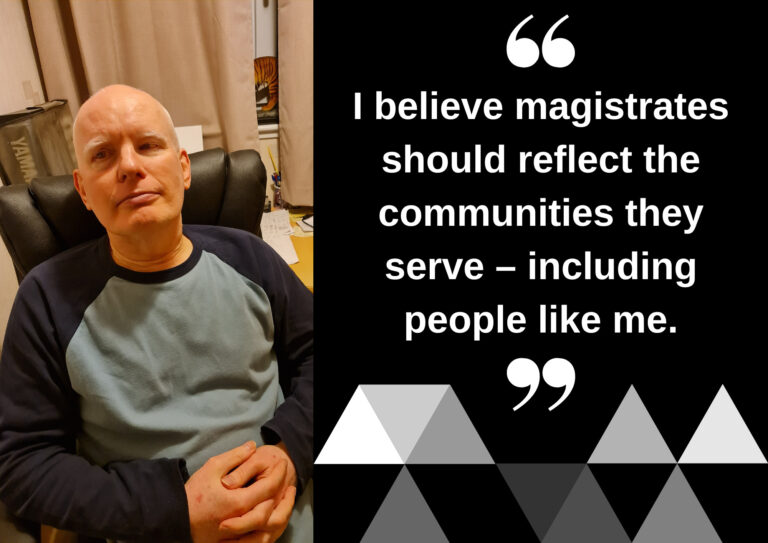Why diversity in the magistracy matters

With over 20 years of magistrates’ experience, London-based IT expert Kevin talks about his inspiring journey to becoming a magistrate in the criminal court. Being severely sight impaired, Kevin took it upon himself to set a precedent.
What made you want to become a magistrate?
Back in the 90s, I used to work part-time for the Met Police in Peckham. When I was made redundant from that role, I wanted to continue to work in the field of law enforcement or similar – on a part-time basis.
However, becoming a magistrate wasn’t an option at the time. I am severely sight impaired (registered blind) and, prior to 1998, blind people were not eligible to sit as magistrates.
I applied as soon as the ban was lifted because I believe magistrates should reflect the communities they serve – including people like me.
How would you describe your role as a magistrate?
My role is to preside over proceedings in the adult criminal court with two fellow magistrates. With the support of a legal advisor, we ensure that all elements of proceedings are conducted fairly, timely and in accordance with the law.
While my colleagues, known as ‘wingers’, have equal decision-making powers with me, only I, as the Presiding Justice, speak on behalf of the magistrates in court.
I am also responsible for all those in the courtroom; it’s my job to liaise with everyone, making sure that those who are not experienced (such as first-time offenders) are supported appropriately during their time in court.
What are some of the most rewarding elements of the role?
The most rewarding part of my role is when I have presided over a hearing where I feel justice has been done – such as when a complainant has fallen victim to a scam, such as paying thousands out on non-existent roof repairs. When we as a bench can deal with the defendants, getting appropriate justice and compensation for the complainant, I feel proud to have played a part in upholding fairness.
It is also very good to know that defendants leaving court feel they have been treated fairly and justly and that we have changed their lives for the better.
What do you think are some of the most important qualities needed to be a magistrate?
To be able to listen and concentrate for lengthy periods. You need to start each hearing with a fresh mind and make no judgements until all sides of the argument have been heard. That’s why magistrates are trained on unconscious bias and how this can affect decision-making.
The ability to follow a structured decision-making process and the qualities of fairness and impartiality are also essential.
But, most importantly, if you always aim to be the best version of yourself, then becoming a magistrate is probably right for you.
What would you say to anyone else considering it?
It is an extremely fulfilling role where no two days are the same. You get to take part in a continual learning exercise and go home at the end of the day knowing that you have made a real difference.
You also get to meet a whole new set of like-minded people and I truly believe you will thoroughly enjoy carrying out this important public role. So, apply!
